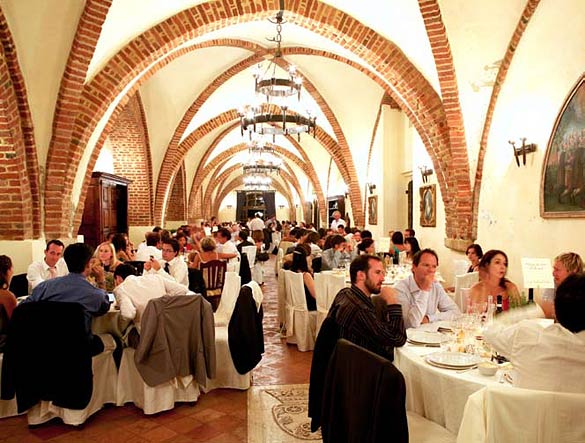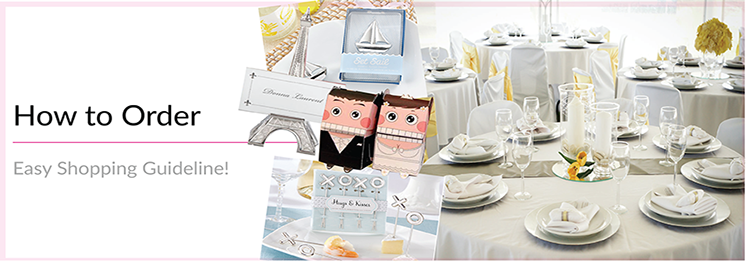Wedding Rehearsals: Rehearsal Dinner Basics
Don't let the name fool you -- it's not just a rehearsal. Here's everything you need to know about this prewedding extravaganza.
Photo: Karen Zieff Photography

What It Is
The rehearsal dinner is traditionally held the night before the wedding, most often a Friday, and usually starts at about seven P.M. This leaves time for attendants who can't take the day off to get out of work to attend the rehearsal itself at around five thirty, and get to the dinner. For a Sunday or holiday wedding, you have more options. Since the rehearsal dinner has become more of a celebration in its own right than just a formality, some couples are holding the event two nights prior to the wedding. This way, there's more time to relax, recuperate, and get ready for the main event. If most attendants won't be arriving until late on the eve of your wedding, a breakfast celebration the morning of the wedding is also acceptable (as is skipping the rehearsal meal altogether!).
What It's For
The dinner is a great opportunity for your two families to get to know each other before the wedding day (if they don't already know each other well) in a not-too-hectic setting. Take advantage of the relaxed environment -- come wedding night, you'll most likely be pulled in too many directions to put in any real quality time with anyone. The ultimate goal here is to relieve some prewedding tension and make everyone invited feel comfortable with the impending nuptials while not upstaging the big event.
Mingle your guests. The dinner is a great opportunity for both of your families to get better acquainted before the wedding day.
Who Hosts
Traditionally, the groom's family organizes and pays for this fete, but you two might take matters into your own hands, or both sets of parents may choose to do the honors together. While you as the honored couple may have input on the overall direction, if the groom's family hosts, you should really try to let his mom and dad be the creative directors of the evening. If, on the other hand, you are hosting, you get to choose the location and style, so you'll want to give yourselves enough time to scout venues in order to book one four to six months in advance.
Who to Invite
At the very least, the rehearsal dinner guest list includes immediate family (parents and siblings), wedding-party members and their spouses or significant others, and the parents of any child attendants (inviting the children themselves is optional). You should also invite the officiant and his or her spouse to the dinner (they may not
come, but it's the polite thing to do).
What It Looks Like
You can choose to have a formal (banquet or garden party) or casual (outdoor picnic or BBQ) event, as long as you don't overshadow what's to come. If the wedding is the climax of the weekend, the rehearsal should be the sneak peek. Since the rehearsal dinner is more informal than the wedding reception, the food and atmosphere should reflect or complement that. Ultimately, the setting of the rehearsal dinner depends on the budget, how many guests there will be, and what kind of party the host envisions.
Where to Have It
A sit-down dinner at a hotel ballroom or fine restaurant is the norm, but there's no reason to feel hemmed in by that. Couples are getting revved up for their wedding day in backyards, at art galleries, and on beaches. Feel free to use the term “dinner" loosely -- cocktails and hors d'oeuvres, a buffet, and even a barbecue are all perfectly acceptable options. (Just be sure you make this clear in your invites so your guests know what to expect.) While you don't have to provide specialty entertainment, here are the typical rehearsal dinner activities.
Who Else to Consider
Turn the dinner into a fabulous welcome party -- if your wedding is mostly local friends and family but a few key people traveled far to come to your wedding (those cousins from Hawaii!), extend the invitation to the as a thank you for their extra effort. If you're throwing a destination wedding or a party where at least half of the guests are from out of town, show your appreciation by inviting everyone to some kind of night-before festivity. If your budget is limited, stick to a more exclusive group for the rehearsal dinner itself but follow it with a large but informal welcome cocktail or dessert party for out-of-towners later in the evening.
How to Invite
If your rehearsal dinner will be a fancy affair with lots of out-of-town guests in a hotel banquet room, a country club, or someplace similarly dressed up, you should send formal invitations. You'll also want people to RSVP so you have a head count for the caterer. If, on the other hand, your rehearsal dinner will be fairly low-key or small—a party at a restaurant or an intimate gathering at your future in-laws' home—then you don't need to be as “official" with your invitations. You can send e-vites, use DIY invites, or call to personally ask people to join you. Just make sure it's clear to your guests where they need to be and when.
When to Send Invites
If you're sending out invitations, get them out with -- or shortly after -- your wedding invitations to help everyone keep their schedules straight, book their travel plans, and ensure timely RSVPs. Give far-flung attendants the basic plans far in advance so they can book flights with the proper arrival time.
> See rehearsal dinner invitation wording samples
What Happens
A few elements are generally incorporated into the festivities—here's what to expect:
- The Meet and Greet
The rehearsal dinner is your chance to welcome everyone. Walk around and catch up with loved ones (and meet more of the in-laws) throughout the evening, because the wedding night will most likely be a bit of a blur. - The Gift Exchange
You may hand out the bridal-party gifts at this occasion, but do it subtly. No matter what, take a moment to stand and thank your bridal party for their support. Parent gifts can also be presented at the rehearsal dinner, but we prefer a more private time. Parents will often break down in tears, and the gift exchange can be a nice last moment for you to connect with them before the festivities. Some brides and grooms also use the occasion to present each other with special wedding gifts or surprises. - The Toast As dessert winds down, the toasts begin. As host of the party, the groom's father (sometimes along with the groom's mother) typically goes to bat first, toasting his soon-to-be daughter-in-law and her family. Next up: Traditionally, the groom also toasts his new wife, the guests, and the hosts, but there's no reason both of you can't stand up to thank everyone together, if you'd prefer.
- The Friendly Reminder While everyone is still seated and you have their attention, it's also your chance to slip in a few last-minute refresher about the next day. Before calling it a night, double-check that everyone in the wedding party knows exactly where to go the next day, what things they're supposed to bring, and when and where they're expected to arrive to get ready. If you have a broader audience, remind guests about any activities for them the next day, as well as pickup times and locations for transportation you've arranged to get them to and from the ceremony.
Resource from: http://wedding.theknot.com/wedding-planning/rehearsal-dinner/articles/wedding-rehearsal-basics.aspx?MsdVisit=1



